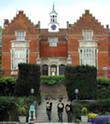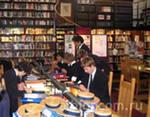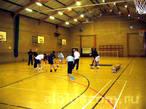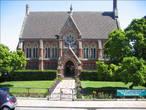Урок-ролевая игра по английскому языку в 9 классе
Education Systems in Great Britain, the USA and Russia
Цели:
социокультурный аспект – знакомство с одной из престижных частных школ Великобритании Харроу; с высказываниями великих и английскими поговорками об образовании;
развивающий аспект – развитие внимания, памяти, способности к догадке, способности к систематизации, обобщению; развитие способности к самооценке;
воспитательный аспект – воспитание любознательности, познавательных потребностей, желания расширять кругозор; развитие умения сотрудничать;
учебный аспект – развитие речевых умений (монологическая, диалогическая форма речи), контроль знаний учащихся о системах образования в Великобритании, США и России.
Подготовительная работа:
Ознакомление с новой лексикой, отработка лексики в упражнениях, устной речи на предыдущих уроках, знакомство с системами образования в Великобритании, США, России;
Распределение ролей, продумывание высказываний, подготовка опорной карточки для уч-ся с целью оказания помощи в построении устного высказывания;
Подготовка презентации, карточек, флагов стран;
Расстановка столов в кабинете.
Ход урока
Вступительное слово учителя, фонетическая зарядка.
Teacher: Good morning, boys and girls! At the beginning of our lesson I want you to have a look at the 1st slide of the presentation. You can see the portraits of two great British persons, a writer and a philosopher. Read their quotations and try to guess what word should stand in them instead of dots? Can you guess? Yes, it’s right; it is the word “education”. (слайд 1)
Education is a very important thing in every person’s life. That’s why every country spends a lot of money on it and tries to improve and develop its system of education as well as possible.
At our last lessons you learned about education systems in three countries: Great Britain, the USA and Russia. Today we have a lesson of a role play game. The aim of our lesson is to revise and summarize everything you know about it. I hope you’ll learn something more about schools in Britain and it will be interesting for you. (слайд 2)
Let’s start with our vocabulary. Look at the 2nd slide, read after me. Give the English equivalents of some Russian words.
(state, independent, private, primary, secondary, boarding school, compulsory, optional, a comprehensive school, to pass an exam, an entrance exam, an opportunity, further education) (слайд 3)
Игра «Телемост».
Teacher: All of you enjoy playing, don’t you? Let’s play now. Imagine that we are in a TV studio. I give a word to the TV hosts. (ниже приведён приблизительный сценарий игры, выступления учащихся)
TV Host 1 (student 1): Good morning, dear TV viewers! We are glad to greet you on Channel 1 of Russian television. It’s time to start our programme “News for the Youth”. Today our programme is in the form of a TV Bridge.
TV Host 2 (student 2): Hello, everybody! The topic of our discussion today is “Education Systems of three countries: Great Britain, the USA and Russia”. We are glad to meet you as our guests. Do you see each other well? Do you hear us well?
TV Host 1: Let’s start. Let me introduce you to each other. Today the students from Great Britain are taking part in our TV Bridge. Let’s greet them. Hi! How are you?
Students from Great Britain. Student 1: Hello, everybody, we’d like to tell about schools in our country. (слайд 4)
In England about 93% of children attend state school, which are free; the other 7% attend independent schools – private and public schools. Some of these schools are boarding schools where children learn and live. If parents want to send their children to a public or a private school, they have to pay for their education. For small children there are kindergartens or “nursery classes” in schools which are optional.
Student 2: Secondary education is compulsory. It means that all children must attend school between the ages of 5 and 16. Most children start their education at the age of 5. Primary school may be divided into two parts: during the first two years reading, writing and arithmetic are taught for about 20 minutes a day. Much time is spent in modeling from clay or drawing, reading and singing. In Year 3 the “real” work starts. Children have lessons in arithmetic, reading and composition. History, Geography, Nature Study, Art and Music PE, Swimming are also in timetable. All schools follow the same National Curriculum. The children attend secondary school for 6 years.
Student 3: Comprehensive schools provide compulsory education for children between the ages of 11 and 16. Comprehensive schools offer 5-year courses to all pupils; there are no entrance exams there. Some children enter Grammar schools which also provide secondary education. If a pupil wants to study at a grammar school, he or she has to pass the 11+exam. There are 10 subjects, which all children must study at secondary school. The whole period of compulsory education is divided into four stages. At the end of each stage (Years 2, 6, 9 and 11) pupils have national exams.
TV Host 1: Thank you very much for your interesting story. I think students from other countries have learned a lot about your schools. Who has got any questions? The delegation from GB is ready to answer them.
Russian student: I’ve got a question. Do you have to wear a school uniform? Do you like it?
British student: Yes, we wear school uniforms. As usual, each school has its own school uniform. I think this fact makes us be more disciplined.
TV Host 2: Now the word is given to the students from the USA. Let’s listen to them.
Students from the USA. Student 1: Hi! We are from America and we’d like to tell about the education system of our country. In the USA most children attend public schools that are free. 10 % of children go to schools that their parents pay for; these schools are called private schools. In our country national, state and local government decide what subjects will be taught in schools, so children in different states study different subjects. Most schools, however, teach very similar subjects. (слайд 5)
Student 2: In the USA education is compulsory between the ages of 6 and 18. But the age of starting school is different in different states. Children start school between 5 and 7 years old, the age of finishing school is between 16 and 18 years.
Student 3: Primary education in our country is provided by elementary schools, also known as grade schools or grammar schools. Sometimes primary education includes kindergartens as well. Primary education is either 5 or 8 years. After elementary school children attend middle school for about 3 years. Secondary education is provided by High Schools. A student can attend either combined Junior-Senior High School or Junior High, which includes grades from 7 to 9 and Senior High School, which includes grades from 9 to 12. So, secondary education takes 6 years.
Student 4: I’d like to say a few words about tests and exams. We don’t take national examinations, but students in High School usually take exams in the subjects they are studying at the end of each semester. American students who want to get higher education must take a test which is called SAT (Scholastic Aptitude Test) during the last year in High School. SATs are not free, students must pay money to take a test. Then their results are sent to three colleges that the hope to go to. That is all we can say about the education system in the USA.
TV Host 1: Thank you very much, friends. Your story was rather detailed and informative. By the way, if you haven’t caught anything, you may ask our American students questions.
TV Host 2: And now, let’s listen to our friends from Russia.
Students from Russia. Student 1: Hi, friends! We are from Russia and we’d like to tell about the system of education in our country. Most children – 99% in Russia attend state schools which are free, and only 1 % attend private schools. Parents have to pay for their children if they want to send them to private schools. Education in Russia is compulsory between the ages of 6 and 15. Basic education takes 9 years: children first attend primary school for 4 years and then secondary school in which they study for 5 years. (слайд 6)
Student 2: A few words about pre-school education in Russia. It is optional. It is provided by kindergartens and nursery classes in schools. At primary school children learn maths, Russian, reading, nature study, PE, music, drawing, and handicrafts. At secondary school – maths, Russian, literature, history, biology, geography, foreign language, IT, PE, physics, chemistry. Most children attend schools of general education, but some students attend lyceums or gymnasiums. At the end of the 9-year course pupils take a compulsory examination in 4 subjects.
Student 3: I’d like to tell about opportunities which Russian students have when they finish a school of general education. After the 9th year course they can attend senior secondary school for 2 years. At the end of studying they have to take complete secondary school exams. As a rule, two of them are in the form of written tests and three exams at pupil’s choice. If they pass the exams they get a Certificate of Complete Secondary Education.
Student 4: And I’d like to say a few words about the opportunities which students in Russia have after finishing secondary education. We can continue studying to get higher education. Russian students can try to enter the University or Academy; if they have musical talents they can study at Conservatory. There are also Technical Colleges and Vocational Schools in our country. If students study successfully they get a Specialist’s Diploma.
TV Host 1: Thank you, Russian friends, for your story. We enjoyed it very much. Personally I have learned a lot.
Тест на компьютерах. Контроль знаний учащихся по данной теме.
Teacher: So, you’ve heard the three stories. Now you will do a test on computers and see how well you know the systems of education in these countries. (слайд 7)
Computer Test
(используется Конструктор Тестов Адаптивной Среды Тестирования АСТ)
Match the English words with their Russian equivalents:
state – бесплатный
private – необязательный, факультативный
compulsory – общеобразовательный
optional – частный
comprehensive – государственный
free - обязательный
Match the items in the left column which are about Great Britain with the same in the right one about the USA:
a state school - a high school
a primary school – grade
a secondary school – a public school
form – class
lesson - an elementary school
Match the expressions with their meanings:
to go to school – to be in the school building to study
to be at school – to attend a school, not a college or a university or have a job
to be in school – to attend school regularly
to take/have exams/tests – to get a bad mark in exams/tests
to pass exams/tests – to do examinations
to fail exams/tests – to have a good mark in exams or tests
Fill in the right preposition:
Most children in most countries go___ state schools which are free.
___ the age of 16 English students write an examination called GCSA.
At the end of the 9- year course students in Russia take a compulsory examination___ four subjects.
Choose the right variant:
The USA free schools are called ___(a. state schools; b. public schools; c. private schools)
The education in Russia is compulsory between the ages of ___(a. 5 and 15; b. 6-7 and 17; c. 6-7 and 15)
Basic education in Russia takes ___ years. (a. 9; b. 10; c. 11)
High schools in America provide ___ education. (a. secondary; b. higher; c. elementary)
Most children in Great Britain attend ___ schools where education is free. (a. private; b. state; c. comprehensive)
Schools where children not only study but also live are called ___ schools. (a. primary; b. public; c boarding.)
Put the stages of education in the right order:
Primary
Pre-school (kindergartens/nursery classes)
Higher
Secondary
(Keys: 1. state – государственный; private – частный; compulsory – обязательный; optional – необязательный, факультативный; comprehensive – общеобразовательный; free – бесплатный.
2. a state school - a public school; a primary school – an elementary school; a secondary school – a high school; form – grade; lesson – class.
3. to go to school – to attend school regularly; to be at school – to attend a school, not a college or a university or have a job; to be in school – to be in the school building to study; to take/have exams/tests – to do examinations; to pass exams/tests – to have a good mark in exams or tests; to fail exams/tests – to get a bad mark in exams/tests.
4. to; 5. At; 6. in; 7. public schools; 8. 6-7 and 15; 9. 9; 10. secondary; 11. state; 12. boarding; 13. Pre-school (kindergartens/nursery classes), Primary, Secondary, Higher.)
Рассказ ученика о частной школе Харроу (Англия)
Teacher: Thank you for your work, friends. Today we have a guest at our lesson. It is a student from Great Britain and he will tell us about his school. I think it’ll be interesting for you. (Одному из учащихся было дано индивидуальное домашнее задание: подготовить рассказ о частной школе Харроу; рассказ сопровождается показом слайдов 8, 9, 10, 11, 12, 13)
Student: Hello! My name is Steven . I am a student of Harrow School, which is known simply as “Harrow”. I’d like to tell a few words about my school. It is an English independent school which is situated in the town of Harrow, in the north-west London. My school was founded in 1572 as a public school for the children of poor families and very soon became one of the most prestigious schools. My school is for boys, today 850 boys study in Harrow. I should say that it has 19 boarding houses where we live. Each boy has a separate bedroom or shares a room with another boy.
Harrow is rich in its history and traditions, for example, our school uniform. Every day we wear white shirts, black silk ties, light grey trousers, black shoes and dark blue jackets. You can see also our traditional Straw Hats.
We have a lot of opportunities not only to study, but also to do different sports: golf, tennis, swimming, football and many others. There are beautiful lawns, sports grounds, a stadium and gyms around and in Harrow.
I am proud that many world-famous people, such as Winston Churchill and six other Prime Ministers of Great Britain and the poet Lord Byron attended Harrow.
Now I want you to watch a short video film about my school which was shot by my friend. (Учащиеся просматривают фильм Life at Harrow School – an overview)
Работа в группах. Чтение текстов и выполнение задания.
Teacher: Thank you, Steven, for your story and video, I think they’ve interested our students. Now, let’s form three groups. You’ll read the texts and do the tasks. (Учащиеся в группах читают тексты и выполняют задание; слайд 14).
Education in the United Kingdom
Read the texts (1-5) and match them with the headlines (A-F). One headline is extra.
Schools for rich people.
School for boys.
The history of public schools.
Living and studying.
The famous school.
Schools in Great Britain.
The school system in the UK may seem rather confusing for people from other countries. There are two types of schools in the UK. Most of them are state schools where education is free. But there are also private schools where you have to pay. Such schools are often very expensive. It may seem strange, but private schools in Britain are called public.
A long time ago when education was a privilege of the rich, the only schools where poor people could go got the money from charity (благотворительные) organizations. As it was public money, the schools for the poor were called public schools. Some of these public schools were very successful and later they became expensive private schools for rich people. But the conservative British continued to call them public schools.
Harrow School was founded in 1572 as a public school for the children of poor families but very soon became one of the most prestigious private schools in the country. It is known that Winston Churchill and six other Prime Ministers of Great Britain and the poet Lord Byron attended this school.




Harrow is an all-boys school with 800 pupils. It has nineteen boarding houses. A boarding house is a building where pupils sleep and rest. Each boy has a separate bedroom or shares a room with another boy. The teachers also have their own rooms to stay in the school all the time and make sure that the students get a lot of evening and weekend activities.
The first thing you need to have is money as studying at some public schools costs up to 20,000 pounds a year. There are also grants for bright pupils from poor families but the places are few and the competition is very strong. It’s not surprising that only six percent of the people in the UK can study at public schools
(Key: 1 – F; 2 – C; 3 – E; 4 – D; 5 – A)
Teacher: Let’s check your reading task now.
Заключительный этап. Работа над поговорками об образовании.
Teacher: Thank you for your work, you have done the task in reading correctly. At the end of our lesson I’d like you to read these words of wisdom about learning and education and give the Russian equivalents of them. I think it’ll be useful for you. (слайд 15)
Рефлексия, подведение итогов урока, выставление оценок.
Teacher: You’ve worked hard at the lesson today, thank you for it. Look at the board and complete the sentences:
At the lesson today I have learned about …
I’ve found the most useful …
The most difficult task for me at the lesson was …
Your marks for your work at the lesson are …




















